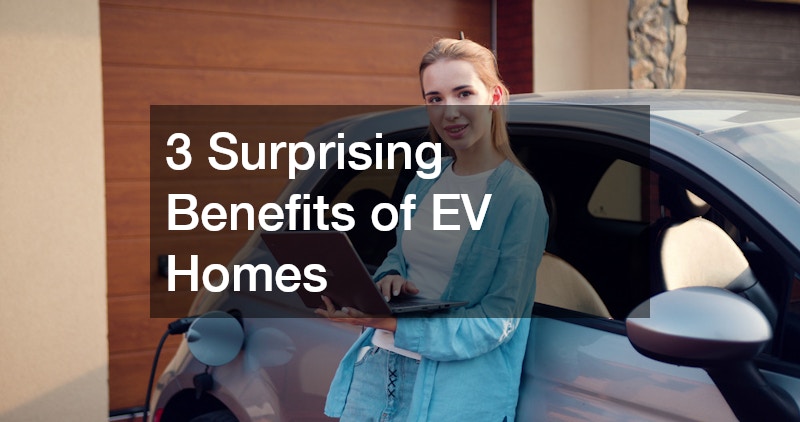
Electric vehicle (EV) homes are gaining popularity as the world moves towards sustainable living. They offer not just environmental benefits but also surprising advantages that may not be immediately apparent. This article explores these benefits and addresses common inquiries people have about EV homes.
How do EV homes contribute to energy efficiency?
Electric vehicle homes contribute to energy efficiency by seamlessly integrating electric vehicles with energy-efficient home systems, such as solar panels and smart energy management technologies. This integration creates a synergy that allows homeowners to optimize the energy consumption of both their homes and vehicles.
For example, an EV home equipped with solar panels can produce and store energy during the daytime, which can then be used to power the EV and the home during peak energy demand hours or at night.
The installation of a smart energy management system in EV homes further enhances power stability by allowing homeowners to monitor and control energy usage in real-time. These systems can automate energy consumption patterns based on peak demand times, ensuring that the electric vehicle charges when energy demand is lower and costs are less. As a result, the overall energy consumption of the home is reduced, leading to lower electricity bills and a decreased strain on the power grid.
Another aspect of energy efficiency is the use of bidirectional charging, which allows electricity to flow both from the grid to the vehicle and vice versa. This technology enables electric vehicles to serve as a backup energy source during power outages, thereby stabilizing the household’s power supply. By reducing dependency on external energy sources and optimizing energy consumption, EV homes not only enhance energy efficiency but also promote sustainability and resilience.
Can EV homes save money in the long run?
One of the common concerns about transitioning to an EV home is the initial cost, which can appear prohibitive at first glance. However, the long-term financial benefits often outweigh the initial investment. The integration of renewable energy solutions, such as solar panels, with EV technology can significantly reduce electricity costs. Once the systems are in place, homeowners can potentially save thousands of dollars over the lifespan of the equipment. Tax incentives and rebates are also often available to make the transition financially viable.
Moreover, electric vehicles themselves tend to be more economical in terms of maintenance and fuel costs compared to traditional internal combustion engine vehicles. EVs have fewer moving parts, require no oil changes, and boast regenerative braking systems that extend the lifespan of the brakes. Additionally, the cost of charging an electric vehicle is generally less than the equivalent amount of gasoline. As EV technology advances, these cost savings continue to grow, making the financial advantages of EV homes even more attractive in the long run.
Furthermore, EV homes can increase in property value over time, driven by the growing demand for sustainable living spaces. As more buyers prioritize energy-efficient and eco-friendly homes, properties equipped with EV technology and renewable energy systems become more desirable, thus potentially increasing their market value. This appreciation in property value, combined with reduced energy and maintenance costs, underscores the significant financial benefits of investing in an EV home.
Are there any environmental benefits of incorporating EV technology at home?
The environmental impact of EV technology at home goes beyond reducing carbon emissions from transportation. By using renewable energy sources like solar power, EV homes reduce reliance on fossil fuels, thereby decreasing the carbon footprint associated with energy consumption. This shift plays a critical role in combating climate change and promoting cleaner air quality in residential areas. By cutting down on greenhouse gas emissions, EV homes contribute to sustainable energy practices at a domestic level.
EV homes also promote a more sustainable ecosystem by reducing waste associated with traditional energy sources. The use of solar panels, wind turbines, or other renewable energy systems minimizes the environmental impact of energy production and consumption. Additionally, electric vehicles themselves contribute to significant reductions in air pollutants, which are a substantial concern in urban environments. By incorporating these green technologies, EV homes play a vital role in advancing the transition to a sustainable future.
What are the lifestyle impacts of transitioning to an EV home?
Transitioning to an EV home can have profound lifestyle impacts, fostering a community-oriented and sustainable way of living. With the integration of smart home technology, residents experience enhanced convenience and control over their domestic environment. Smart applications can monitor energy consumption, provide analytics, and offer suggestions on how to optimize energy use—all contributing to smarter, environmentally friendly living decisions. These features result in a shift towards more conscious resource utilization, engaging residents in sustainable practices.
The lifestyle changes associated with EV homes also encourage individuals and families to embrace eco-friendly habits beyond just energy consumption. By adopting electric vehicles, residents partake in a lifestyle centered on sustainability—choosing energy-efficient appliances, reducing waste, recycling more diligently, and even adopting plant-based diets. As part of a broader movement towards sustainability, households may influence their local communities, inspiring friends, neighbors, and coworkers to consider similar transitions.
The integration of electric vehicle technology into homes offers a host of benefits that extend beyond mere transportation. From energy efficiency and cost savings to environmental and lifestyle improvements, EV homes present a compelling case for the future of sustainable living. As more homeowners recognize these advantages, the adoption of EV homes is likely to increase, showcasing their vital role in fostering a more sustainable, resilient, and eco-friendly world. By embracing this innovative blend of transportation and domestic technology, society can accelerate the transition towards a cleaner and more sustainable future.




